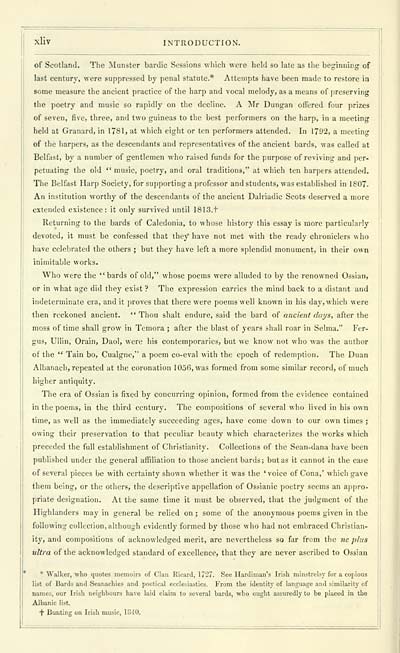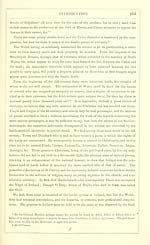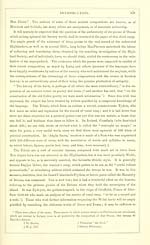Blair Collection > Sar-obair nam bard gaelach, or, The beauties of Gaelic poetry, and lives of the Highland bards > Volume 2
(38)
Download files
Complete book:
Individual page:
Thumbnail gallery: Grid view | List view

xliv
INTRODUCTION.
of Scotland. The Minister bardic Sessions which were held so late as the beginning of
last century, were suppressed by penal statute* Attempts have been made to restore in
some measure the ancient practice of the harp and vocal melody, as a means of preserving
the poetry and music so rapidly on the decline. A Mr Dungan offered four prizes
of seven, five, three, and two guineas to the best performers on the harp, in a meeting
held at Granard, in 17S1, at which eight or ten performers attended. In 17^2, a meeting
of the harpers, as the descendants and representatives of the ancient bards, was called at
Belfast, by a number of gentlemen who raised funds for the purpose of reviving and per-
petuating the old " music, poetry, and oral traditions," at which ten harpers attended.
The Belfast Harp Society, for supporting a professor and students, was established in 1807.
An institution worthy of the descendants of the ancient Dalriadic Scots deserved a more
extended existence: it only survived until 1813. T
Returning to the bards of Caledonia, to whose history this essay is more particularly
devoted, it must be confessed that they have not met with the ready chroniclers who
have celebrated the others ; but they have left a more splendid monument, in their own
inimitable works.
Who were the "bards of old," whose poems were alluded to by the renowned Ossian,
or in what age did they exist ? The expression carries the mind back to a distant and
indeterminate era, and it proves that there were poems well known in his day, which were
then reckoned ancient. " Thou shalt endure, said the bard of ancient days, after the
moss of time shall grow in Temora ; after the blast of years shall roar in Selma." Fer-
gus, Ullin, Orain, Daol, were his contemporaries, but we know not who was the author
of the " Tain bo, Cualgne," a poem co-eval with the epoch of redemption. The Duan
Albanach, repeated at the coronation 1056, was formed from some similar record, of much
higher antiquity.
The era of Ossian is fixed by concurring opinion, formed from the evidence contained
in the poems, in the third century. The compositions of several who lived in his own
time, as well as the immediately succeeding ages, have come down to our own times ;
owing their preservation to that peculiar beauty which characterizes the works which
preceded the full establishment of Christianity. Collections of the Sean-dana have been
published under the general affiliation to those ancient bards; but as it cannot in the case
of several pieces be with certainty shown whether it was the ' voice of Cona,' which gave
them being, or the others, the descriptive appellation of Ossianic poetry seems an appro-
priate designation. At the same time it must be observed, that the judgment of the
Highlanders may in general be relied on; some of the anonymous poems given in the
following collection, although evidently formed by those who had not embraced Christian-
ity, and compositions of acknowledged merit, are nevertheless so far from the ne plus
ultra of the acknowledged standard of excellence, that they are never ascribed to Ossian
"' Walker, who quotes memoirs of Clan Ricard, 17-7. See Hardiman'a Irish minstrelsy for a copious
list of Bards and Seanachies and poetical ecclesiastics. From the identity of language and similarity of
names, our Irish neighbours have laid claim to several hards, who ought assuredly to be placed in the
Alhanic list.
+ Bunting on Irish music, 1840.
INTRODUCTION.
of Scotland. The Minister bardic Sessions which were held so late as the beginning of
last century, were suppressed by penal statute* Attempts have been made to restore in
some measure the ancient practice of the harp and vocal melody, as a means of preserving
the poetry and music so rapidly on the decline. A Mr Dungan offered four prizes
of seven, five, three, and two guineas to the best performers on the harp, in a meeting
held at Granard, in 17S1, at which eight or ten performers attended. In 17^2, a meeting
of the harpers, as the descendants and representatives of the ancient bards, was called at
Belfast, by a number of gentlemen who raised funds for the purpose of reviving and per-
petuating the old " music, poetry, and oral traditions," at which ten harpers attended.
The Belfast Harp Society, for supporting a professor and students, was established in 1807.
An institution worthy of the descendants of the ancient Dalriadic Scots deserved a more
extended existence: it only survived until 1813. T
Returning to the bards of Caledonia, to whose history this essay is more particularly
devoted, it must be confessed that they have not met with the ready chroniclers who
have celebrated the others ; but they have left a more splendid monument, in their own
inimitable works.
Who were the "bards of old," whose poems were alluded to by the renowned Ossian,
or in what age did they exist ? The expression carries the mind back to a distant and
indeterminate era, and it proves that there were poems well known in his day, which were
then reckoned ancient. " Thou shalt endure, said the bard of ancient days, after the
moss of time shall grow in Temora ; after the blast of years shall roar in Selma." Fer-
gus, Ullin, Orain, Daol, were his contemporaries, but we know not who was the author
of the " Tain bo, Cualgne," a poem co-eval with the epoch of redemption. The Duan
Albanach, repeated at the coronation 1056, was formed from some similar record, of much
higher antiquity.
The era of Ossian is fixed by concurring opinion, formed from the evidence contained
in the poems, in the third century. The compositions of several who lived in his own
time, as well as the immediately succeeding ages, have come down to our own times ;
owing their preservation to that peculiar beauty which characterizes the works which
preceded the full establishment of Christianity. Collections of the Sean-dana have been
published under the general affiliation to those ancient bards; but as it cannot in the case
of several pieces be with certainty shown whether it was the ' voice of Cona,' which gave
them being, or the others, the descriptive appellation of Ossianic poetry seems an appro-
priate designation. At the same time it must be observed, that the judgment of the
Highlanders may in general be relied on; some of the anonymous poems given in the
following collection, although evidently formed by those who had not embraced Christian-
ity, and compositions of acknowledged merit, are nevertheless so far from the ne plus
ultra of the acknowledged standard of excellence, that they are never ascribed to Ossian
"' Walker, who quotes memoirs of Clan Ricard, 17-7. See Hardiman'a Irish minstrelsy for a copious
list of Bards and Seanachies and poetical ecclesiastics. From the identity of language and similarity of
names, our Irish neighbours have laid claim to several hards, who ought assuredly to be placed in the
Alhanic list.
+ Bunting on Irish music, 1840.
Set display mode to: Large image | Transcription
Images and transcriptions on this page, including medium image downloads, may be used under the Creative Commons Attribution 4.0 International Licence unless otherwise stated. ![]()
| Early Gaelic Book Collections > Blair Collection > Sar-obair nam bard gaelach, or, The beauties of Gaelic poetry, and lives of the Highland bards > Volume 2 > (38) |
|---|
| Permanent URL | https://digital.nls.uk/75794614 |
|---|
| Description | Vol. II. |
|---|---|
| Shelfmark | Blair.66 |
| Additional NLS resources: | |
| Attribution and copyright: |
|
| Description | A selection of books from a collection of more than 500 titles, mostly on religious and literary topics. Also includes some material dealing with other Celtic languages and societies. Collection created towards the end of the 19th century by Lady Evelyn Stewart Murray. |
|---|
| Description | Selected items from five 'Special and Named Printed Collections'. Includes books in Gaelic and other Celtic languages, works about the Gaels, their languages, literature, culture and history. |
|---|

